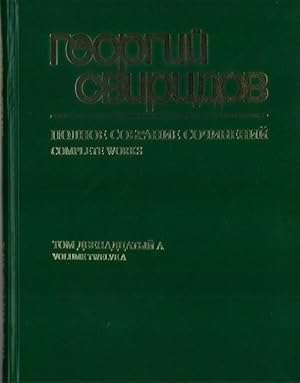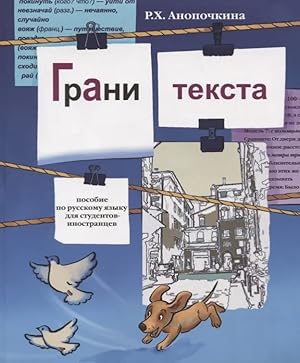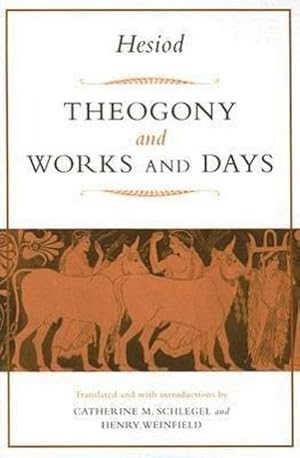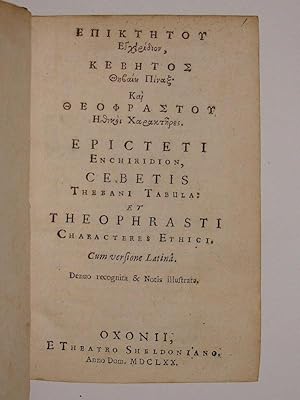Songs for the Philologists (9 Ergebnisse)
Produktart
- Alle Produktarten
- Bücher (8)
- Magazine & Zeitschriften
- Comics
- Noten (1)
- Kunst, Grafik & Poster
- Fotografien
- Karten
-
Manuskripte &
Papierantiquitäten
Zustand
Einband
Weitere Eigenschaften
- Erstausgabe (2)
- Signiert
- Schutzumschlag
- Angebotsfoto (6)
Land des Verkäufers
Verkäuferbewertung
-
Sviridov. Complete works. Vol. 12A. From Shakespeare. For mezzo-soprano and bass. Sailor's Song. Songs on Words by Robert Burns. For bass
Verlag: Natsionalnyj Sviridovskij fond, 2012
Anbieter: Ruslania, Helsinki, Finnland
Noten
Zustand: new. Pages: 128 Language: Russian, English. Volume 12 A of the Complete Works of the great Russian composer Georgy Sviridov (1915-1998) includes the vocal cycle I'ront Shakespeare (21nd ed. 1961) for mezzo-soprano and bass, Songs on words by Robert Burns (1955) and the Sailor 's Song on Allan Cunningham's words (late 1940s) for bass. All texts are given in Russian with a transliteration. When the Russian translations were equirhythmic to the English originals, they have also been added to the score. The volume starts with introductory articles hy the British musicologist Stuart Campbell and the Russian musicologist Maria Chuikova who also includes musical textual commentary in her article. The publication also contains commentaries by the musical editor of the volume Pavel Lukyanchenko (on the musical texts) and the philologist Sergey Subbotin (on the poetic: texts used by Sviridov) . The general editor of the volume is the musicologist Alexander Belonenko. CONTENTS Stuart Campbell English and Scottish poetry and drama in Sviridov's songs Maria Chuikova 'My old Albion.' (in Russian) Pavel Lukyanchenko Text-critical commentary to the music text (in Russian) Sergey Subbotin Text-critical commentary to the literary text (in Russian) FROM SHAKESPEARE Seven songs for mezzo-soprano and bass. On words by William Shakespeare 1. Man's Ingratitude (bass). Translated by Leonid Martynov 2. A Soldier's Toast. Iago's Song from the Music for the Tragedy Othello (bass). Translated by Boris Pasternak 3. Iago's song about King Stephen from the Music for the Tragedy Othello (bass). Translated by Boris Pasternak 4. Winter (bass). Translated by Boris Pasternak 5. The Clown's Song from the Comedy Twelfth Night (bass). Translated by Mikhail Lozinsky 6. Desdemona's Willow Song from the Music for the Tragedy Othello (mezzo-soprano). Translated by Boris Pasternak 7. The Gravedigger's Song from the Tragedy Hamlet (bass). Translated by Boris Pasternak SAILOR'S SONG For bass. On words by Allan Cunningham. Translated by Wilhelm Levik SONGS ON WORDS BY ROBERT BURNS For bass. Translated by Samuil Marshak 1. The Winter of Life 2. The Sodger's Return 3. John Anderson, My Jo 4. Robin 5. The Highland Laddie . 6. Findlay 7. The Day is Gane, and Mirk's the Night 8. Farewell 9. A Man's a Man For A' That Summary 9790706397009.
-
A Philosopher of Scripture. The Exegesis and Thought of Taná ¥um ha-Yerushalmi
Verlag: Brill, Leiden, 2019
ISBN 10: 9004382216ISBN 13: 9789004382213
Anbieter: ERIC CHAIM KLINE, BOOKSELLER (ABAA ILAB), Santa Monica, CA, USA
Buch Erstausgabe
First edition. Octavo. x, 479, (1)pp. Indices and 43 page bibliography. Green buckram lettered in white with red band near top of spine. A fine, as new copy. Taná ¥um b. Joseph ha-Yerushalmi (d. 1291, Fusá Ä á , Egypt) was a rigorous linguist and philologist, philosopher and mystic, and a biblical exegete of singular breadth. As well as providing us with an insight into the inner world of a profound and original thinker, his oeuvre sheds light on a Jewish historical and cultural milieu that remains relatively poorly understood: the Islamic East in the post-Maimonidean period. In A Philosopher of Scripture: The Exegesis and Thought of Taná ¥um ha-Yerushalmi, Raphael Dascalu presents the first detailed intellectual portrait of Taná ¥um ha-Yerushalmi. Taná ¥um emerges as a polymath with a clear intellectual program, an eclectic thinker who brought multiple traditions together in his search for the philosophical meaning of Scripture. (Publisher) Contents: Taná ¥um ha-Yerushalmi's life and works -- Taná ¥um's biblical exegesis in context -- Taná ¥um's commentary to the Book of Jonah -- Taná ¥um's commentary to Qohelet -- Taná ¥um's commentary to the Song of Songs. Note: This is a revised version of the author's thesis (doctoral)--The University of Chicago, 2016. Volume 80 in the Brill series "Etudes sur la Judaisme Medieval." (EJM).
-
Grani teksta: Uchebnoe posobie po russkomu jazyku dlja inostrannykh studentov-nefilologov
Verlag: Russki yazyk. Kursy, 2014
ISBN 10: 588337199XISBN 13: 9785883371997
Anbieter: Ruslania, Helsinki, Finnland
Buch
Zustand: new. Pages: 208 Language: Russian. Facets of the text This manual is designed for foreign non-philologist students who learn Russian as a foreign language. The main purpose of this book is to help the foreign students to develop oral speech skills and to acquire skills of working with different kinds of texts. Students of the first and second certificate levels are the target group. The book presents scientific, business, journalistic, literary texts aimed at developing the skills of reading, retelling, writing business documents, summaries and essays, etc. The book is provided with the exercises to train and develop skills mentioned above. The book consists of nine chapters. Every chapter has the following headings: "New words for your dictionary", "Nota bene," "Grammar", "Let's listen to a song". 9785883371997.
-
Theogony
Verlag: The University Of Michigan Press Sep 2006, 2006
ISBN 10: 0472069322ISBN 13: 9780472069323
Anbieter: AHA-BUCH GmbH, Einbeck, Deutschland
Buch
Taschenbuch. Zustand: Neu. Neuware - Written in the late eighth century BC by Hesiod, one of the oldest known of Greek poets, 'Theogony' and 'Works and Days' represent the earliest account of the origin of the Greek gods, and an invaluable compendium of advice for leading a moral life, both offering unique insights into archaic Greek society. There are a number of modern translations of Hesiod available, rendered in serviceable English, but until now no one has created a work of literature equal to the original. This translation is the result of a unique collaboration between a classicist and a poet, capturing in English 'fourteeners' the works' true poetic flavor while remaining faithful to the Greek text and the archaic world in which it was composed.This translation contains a general introduction, a translator's introduction, notes, and a glossary. It will be of interest to general readers, students of and specialists in classical literature, and lovers of poetry. 'This Schlegel-Weinfield translation of Hesiod is superbly crafted: compelling, unforgettable poetry to be read aloud with delight and gratitude.'--Allen Mandelbaum, Endowed Kenan Professor of Humanities, Wake Forest University 'This exciting and unique collaboration between a classical philologist and a poet will not just provide insight into archaic Greek society, but also offer something new: the opportunity to experience the richness of Hesiod's style, language, and modes of thought with remarkable fidelity to the ancient Greek. Weinfield and Schlegel make Hesiod sing.'--Carole Newlands, Classics Department, University of Wisconsin 'Schlegel and Weinfield have produced one of the most remarkable of a current resurgence oftranslations from the classics, allowing the modern world to hear a poet who may have known Homer. Hesiod's song makes us understand why the Greeks thought a poet could draw dolphins through the seas or raise the walls of Thebes. Weinfield translates by ear and transfers what he hea.
-
Catalectes, ou Pièces choisies des anciens, recueillies en deux livres par Ioseph Scaliger. Traduction en vers par Michel de Marolles, abbé de Villeloin.
Anbieter: Antiquariaat Wim de Goeij, Kalmthout, ANTW, Belgien
Verbandsmitglied: ILAB
5. Paris, s.e., 1667, in-8°, xvi + 256 pp, contemporary full calf, rather worn, extremeties damaged, headcaps missing, joints cracked but holding, interior fine apart from a tiny worm gallery in the inner margin of the last work. 16 Pages containing the notes, are bound before the title page. Followed by other translations by Villeloin; Le livre des spectacles et le premier livre des Epigrammes de Martial, 100 pp; Les estreines et les apophorettes ou les présens de Martial, qui composent les deux derniers livres des Epigrammes de ce Poëte, ib., 110 pp; Lettre de M. l'abbé de Villeloin à Monsieur l'abbé de la Victoire, Touchant quelques Traductions de l'Eneïde de Virgile, 1667., 24 pp; L'histoire auguste des six autheurs anciens., Paris, 1667, 32 nn pp; notes, 48 pp, with a 17th-c. score for two songs from Antiquity. Joseph-Juste Scaliger, 1540-1609, philologist and historian. Michel de Marolles, 1600-1681, neither a good translator nor a good priest, but whose collection of engravings is the nucleus of the Cabinet des Estampes.
-
Poemata Pythagorae, & Phocylidis. Cum duplici interpretatione Viti Amerbachii. (Bound with:) Theognidis Megarensis Sententiae, cum versione latina, ita ut verbum verbo conferri possit, addita earundem explicatione, a Philip. Melanth. in Schola Wuiteberggensi. (And:) Sibyllinorum Oraculorum libri VIII. Addita Sebastiani Castalionis interpretatione Latina quae Graeco eregione respondeat. Cum annotationib. Xysti Betuleij in Graeca Sibyllina oracula, et Sebastiani Castalionis in translationem suamque annotationes numeris marginalibus signantur.
Verlag: Ad 1: Strasbourg (Argentorati), Apud Christianum Mylium, 1565. Ad 2: Leipzig (Lipsiae), Ioannes Rhamba excudebat, 1569. Ad 3: Basel (Basileae), Per Ioannem Oporinum, n.d. (Colophon at the end: 'Basileae, Ex officina Ioannis Oporini, Anno Salutis humanae 1555, Mense Augusto), 1565
Anbieter: Antiquariaat Fragmenta Selecta, AMSTERDAM, Niederlande
8vo. 3 volumes in 1: Ad 1: 163,(4),(1 blank) p. Ad. 2: (95,(1 blank)) p. Ad 3: 333,(2),(1 blank) p. Vellum 17 cm (Ref: Ad 1: VD16 P 5452; Hoffmann 3,330 (not this year 1565); Schweiger 1,282 (also not this year). Graesse 5,516. Ad 2: VD 16 ZV 19766; Hoffmann 3,510; Schweiger 1,316. Ad 3: VD16 S 6278; Griechischer Geist aus Basler Presse 462, but see also 460 and 461; Hoffmann 3,396; Schweiger 1,287: 'Enth. Verbess. aus e. Mscr. des Marcus Antimachus zu Florenz. Andere Varr., welche nicht in den Text aufgenommen sind, stehen am Rande'. Brunet 5,370; Ebert 21169; Graesse 6/1,398) (Details: Three rare texts in an unattractive binding. Ad 1: Printer's mark on the title, depicting a furious swan within a laurel wreath. Ad 2: Woodcut round portrait of Melanchthon on the title. Ad 3: Greek text with opposing Latin translation; woodcut initials) (Condition: Vellum dyed red, soiled and very worn; endpapers gone. This was a convolute consisting of 4 volumes. One of them was once removed, leaving an open space exposing the 3 broad bands of an ancient manuscript to which the book has been sewn. First title soiled, and with an old manuscript note in the blank margin; its right edge of the first leaves thumbed. Occasional old ink underlinings and marginalia of the hands of 2 or 3 'adolescentes studiosi'. On the last page in old ink the first 10 lines of a poem of the Hungarian humanist Janus Pannonius, 1434-1472, known all over Europe, 'De paparum creandorum ritu immutato', in which he ridiculed the pope) (Note: Ad 1 & 2: The 'gnome' or 'sententia', the pithy expression of a general thought, is probably as old as human speech. In literature it is allready found in Homer, e.g. the much quoted proverb 'A multitude of masters is no good thing; let there be one master'. (Ilias, II,204) Early Greek poets, among whom Theognis and Phocylides, are supposed to have summarized the ethic doctrines in short 'gnomai', sayings which according to Aristotle are more credible than certain long argumentations. Famous Greek expressions of a striking thought everyone knows are 'gnôthi seauthon' and 'mêden agan'. The 'gnome' was used occasionally in poetry or prose, but as a literary form it can be traced back to the Greek poets Phocylides and Theognis. Phocylides of Milete wrote hexametric and elegiac 'gnômai'. According to Suda he lived ca. 540 B.C. The 200 or so hexameters of his 'Poema nouthêtikon, or 'poema admonitorium' were ascribed to Phocylides in the 16th century. It was first published under his name in 1495. In the 16th century this didactic ethical poem was a very popular schoolbook, as it had been on Byzantine schools for centuries. This edition was probably also meant for young students or schoolboys, it should be studied carefully by 'adolescentes studiosi'. A great number of editions, almost one every year, translations and commentaries were produced by schoolmasters in the 16th century. 'Die Richtung der Zeit ging recht ernstlich dahin, die Jugenderziehung auf eine Vereinigung biblischer Glaubens- und Sittenlehre mit klassischer Reinheit der Form zu gründen' (J. Bernays, Ueber das Phokylideische Gedicht', in 'Jahresbericht des jüdisch-theologischen Seminars', Breslau 1856, p. I) The 'poema admonitorium' then ascribed to Phocylides, was often combined with Theognis, whose work was already a schoolbook in antiquity. Was Theognis purely pagan, the reading of Phocylides was more in line with biblical ethics. The christian ethics found in the work of a noble pagan poet who lived in the 6th century before Christ proved the correctness of the bible, it was thought. The German classical philologist Friedrich Sylburg, 1536-1596, was the first to doubt the attribution of the 'poema admonitorium' to Phocylides. And in 1606 the French genius Joseph Scaliger proved on stylistic grounds, and with respect to the content that the real author was perhaps a Christian. After this the interest in the poem waned, and finally it sank into oblivion. Nowadays the author is called 'Pseudo-Phocylides'. Of the Greek elegiac poet Theognis, also flourishing ca. 540 B.C., survive 1389 lines. As with Phocylides there is dispute about their authenticity. 'We may conjecture that it was popular, if not composed, in aristocratic circles in Athens in the 5th century', C.M Bowra concludes for part of the work of Theognis. (OCD s.v. Theognis) Theognis' songs were probably sung at symposia during the 5th and 4th century B.C. In this time the anthology of verses was formed, which has come down to us. The Greek text of Theognis and its accompanying metrical Latin translation in distichs was produced by the German classical scholar and reformer Philippus Melanchthon, 1497-1560, also known as the intellectual leader of Lutheranism. At the age of 21 he became professor of Greek at the University of Wittenberg. This convolute contains also the Golden verses (carmen aureum or carmina aurea) which are attributed to the Greek philosopher Pythagoras. They were well known among educated readers in Antiquity. In the Renaissance the verses found, like Phocylides and Theognis, a place in schoolbooks. Nowadays the verses are relativily unknown among classicists. The 'carmen aureum' consists of 71 didactic hexameters. Every scholar who looked at these verses seems to have his own opinion about its author, origin and date. (Quot homines, tot sententiae) It is however clear 'from the testimonia that the Golden Verses was highly regarded in late antiquity as a concise formulation of principles of the philosophical life. The Neoplatonists, starting with Iamblichus, probably all used the poem as a propaedeutic moral instruction preparing the way for philosophy proper'. ('The Pythagorean Golden Verses'. With introduction and commentary by J.C. Thom, Leiden, 1995, p. 13) The testimonia indicate also that the authorship of the poem was already problematical in antiquity. (p. 15) The editor and translator of the Golden Verses and Phocylides is the German humanist Vei.
-
50 LIDER : A MATONE DI KINDER FUN DI IDISHE SHULN : AROYSGEGEBN LEKOVED [DEM MEHABERS] FUFTSIK YORIKN YUBILEY
Verlag: New York: Matones Ba Der Sholem Aleykhem Folk Institut, 1926
Anbieter: Dan Wyman Books, LLC, Brooklyn, NY, USA
Erstausgabe
Hardcover. (FT) Original illustrated boards, 4to. , [46] pages. First edition. Brightly colored illustrations on every page. In Yiddish. 50 Poems: A Gift to the Children of the Yidish Schools, published in honor of the Author's fiftieth birthday. SUBJECT(S) : Children's poetry, Yiddish. Children's songs, Yiddish -- Texts. Other Titles: Fuftsik lider. Avrom Reyzn; 1876-1953, was a "Yiddish poet, short-story writer, playwright, and editor. Born in Koidanovo, Russia (now Dzyarzhynsk, Belarus) , Reisen was the son of the Hebrew and Yiddish poet Kalman Reisen (1848-1921) and the brother of the poet, short-story writer, and translator Sarah (Sore) Reisen (1884-1974) and the celebrated philologist Zalman Rejzen (1887-1941) . While he was still a teenager, his talent was recognized by Shalom Aleichem and I. L. Peretz , who arranged for the publication of his earliest poems. After some years in Minsk, Warsaw, Cracow, and Berlin, he settled permanently in New York in 1914. Influenced by Heinrich Heine , whom he translated into Yiddish, he was one of the first Yiddish poets to make use of folksong material. His poetry, though mostly written in conventional quatrains, is suffused by a refined sensibility that adumbrates the writing of Di Yunge . In contrast to the verse of the "sweatshop" generation, such as Morris Vinchevsky or Morris Rosenfeld , his work is characterized by a certain understated Romanticism and melancholy irony. Reisen shared the preoccupation with poverty and social problems manifested by his predecessors, but he entirely eschews their propagandistic rhetoric. Nonetheless, while most of his poetry is softly lyrical, a proportion has sufficiently social-critical implications to have been sung at clandestine workers' meetings in the forests. Many of his poems were set to music and became a standard part of Yiddish folk culture (Denman, EJ, 2011) . Wear and staining to covers, spine bumped . All original spine and binding. Good condition. (YIDCHI-5-3A).
-
Heilig-Epistolischer Bericht, Licht, Geleit und Freud. Das ist Emblematische Fürstellung, der heiligen Sonn- und Festtäglichen Episteln: In welcher gründlicher Bericht, von dem rechten Wort-Verstand, ertheilet; dem wahren Christenthum ein helles Licht furgetragen; und ein sicheres Geleit, mit beigefügten Gebethen und Gesängen, zu der himmelischen Freude, gezeiget wird, von Johann Michael Dillhern.
Anbieter: Centralantikvariatet, Stockholm, Schweden
Zustand: Very Good. Nürnberg, in Verlegnung Johann Andreas Endtern, und Wolfgang des Jungern Seel Erben, 1663. Folio. Engr. extra title,+ (1),+ (26),+ (2, blanks),+ 356, 359-631,+ (33) pp. Illustrated with 85 large emblematic engravings in text. Title printed in red and black and all pages printed within a frame. The engraved extra title and the half title are both pasted on resp. sides of a fly-leaf, which means that the recto of the half title is hidden and only the verso with ?Erklärung dess Kuppffer-Tituls? is visible. Both titles and the first five leaves with tear in lower margin, dampstain in lower margin, more in the middle, minor spotting and some browning. Contemporary vellum. Owner?s label of Anders Persson. VD17 23:269038A. Landwehr, German emblem books, 228. Praz p. 316. Faber du Faur 597. They all miss the jump in the pagination. The engraved title and the emblems are engraved by Melchior Küsell after drawings by Georg Strauch. Each chapter (Epistel) starts with an engraved emblematic picture with a device in the engraving, followed by a verse, a ?Paraphras?, a ?Nutz und Gebrauch? and finally a sermon and a song. The engravings have also been published seprately.The protestant theologian and philologist Johann Michael Dilherr (1604-69) was first active as professor in theology and history at the University in Jena but moved in 1642 to Nuremberg as professor and rector for the newly opened "Aegidianum" Gymnasium and become soon after also chief pastor at the St. Sebaldus Church. He was appointed city librarian and was close to many members of the Pegnesischer Blumenorden, the literary association in Nuremberg with members like Johann Klay and Sigmund von Birken. ?He was himself a talented poet as well as one of the greatest preachers of his time and an expert on music (Faber du Faur). Dilherr?s library of 8,000 volumes is today preserved at the Regional Church Archive in Nuremberg. Many of his sermons were published together in collections in folio with verses and illustrations. Hardcover / Hardback.
-
EPIKTÊTOY Egcheiridion, KEBÊTOS thêbaiou Pinaks; kai THEOPHRASTOY Êthikoi Charaktêres. Epicteti Enchiridion, Cebetis Thebani Tabula; et Theophrasti Characteres Ethici. Cum versione latina. Denuo recognita & notis illustrata.
Verlag: Oxford (Oxonii), E Theatro Sheldoniano, 1670., 1670
Anbieter: Antiquariaat Fragmenta Selecta, AMSTERDAM, Niederlande
8vo. (XV)(1),143(1);95(1),8 p. Calf 15.5 cm (Ref: Oldfather 175, see also 114; Ebert 6771; not in Hoffmann; only 2 copies in the British Libraries; cf. Brunet 2,1012, who mentions an edition of 1707) (Details: Back ruled gilt, and with 4 raised bands. Black morocco shield in second compartment. Boards ruled with double fillet borders. Greek text with facing Latin translation) (Condition: Cover scuffed and worn at the extremes. Head of the spine gone for 1 cm. Front joint beginning to split. Corners bumped) (Note: This book is the first publication for the market, i.e. 'real book', printed in the famous Sheldonian Theatre, which was named after the Chancellor of the University, and archbishop of Canterbury, Gilbert Sheldon. The building, a work of Christopher Wren, was completed in 1668. The Vice-Chancellor of the University John Fell 'the most powerful man on the University' in those days 'persuaded Sheldon that, when not in use, the building might be used for printing. Composing frames and presses, (no less than five, a large number then) all built locally, were moved in before the builders were out, late in 1668 or early 1669'. (N. Barker, 'The Oxford University Press and the spread of Learning, 1478-1978, Oxf., 1978, p. 15) In F. Madan's 'Oxford books, a bibliography of printed works relating to the University and City of Oxford, or printed or published there' (Oxford, 1895-1931) we found for 1670 only a few small occasional publications, e.g. some epicedia (funeral songs), or more or less internal University documents, such as the 'Parecbolae sive excerpta e corpore statutorum Universitatis Oxon. in usum juventutis academicae'. The only real book 'e Theatro Sheldoniano' in 1670 is this Epictetus/Cebes/Theophrastus edition. (Madan, vol. 3 (1931), no. 2853) For the previous year of 1669 Madan mentions only the imprint 'e theatro Sheldoniano' for the occasional poem of Corbet Owen, 'Carmen Pindaricum', a bad poem by the way, which was recited at the opening of the Theatre on the 9th of July 1669. In order to understand the following search for the identity of the editor of this anonymous 1670 edition, one should know that an expanded edition 'e Theatro Sheldoniano' was printed in 1680 (also anonymously), and another one in 1707. The 1707 edition mentions on its title an editor, 'C. Aldrich' (Carolus, Charles Aldrich), student of 'Christ Church'. Later bibliographers assumed that this same Aldrich must also have been responsible for the anonymous 1670 & 1680 editions. Now Aldrich's dates are 1681-1737. (See for Charles Aldrich 'A directory of the parochial libraries of the Church of England and the Church of Wales' by N.R. Ker & M. Perkins, London 2004, p. 235, s.v. Henley-On-Thames, where the story of his library is told) So, Charles Aldrich cannot have produced the edition of 1670, nor that one of 1680. He however gives us a clue to the identity of the editor of the 1680 edition. The real editor of the 1680 edition, we must conclude, is most probably the classical scholar, Dean of Christ Church, bishop of Oxford, John Fell, because Aldrich tells us on page a4-recto of his 'Ad Lectorem' that he 'minime deflexisse' from 'illa Felli editione' of 1680. This could mean of course 'from the edition of the University Press, led by John Fell', but this seems far fetched. More probable is that Aldrich refers to an Epictetus edition of 1680, which was produced by Fell himself. The name on the title of the 1707 edition caused later bibliographers (Fabricius/Harles, Bibliotheca Graeca, Hamburg, 1796, volume V, p. 80, but also Oldfather in his 'Bibliography of Epictetus', no's 114 and 117) to ascribe the 1670 and 1680 edition erroneously to Aldrich. As shown above, the almost certain editor of the 1680 edition is John Fell. On the title of the 1680 edition even the phrase on the title of 1670 'denuo recognita & notis illustrata' was copied. That it is a reprint (with the addition of passages from Prodicus and Cicero, not yet found in the first edition) of 1670 is proved by the reproduction in 1680 of the 1670 misprint of 'viderà' for 'videre' on page A4-verso of the preface. In the preface of 1670 it is admitted that the edition is based on earlier ones, especially those of Meric Casaubon and Salmasius, but the editor claims to have filled some 'lacunae' and to have corrected the Greek text and Latin translation (by Meric Casaubon, first published in 1659), not only with the help of the printed sources, but also by collating manuscripts from the Bodleian Library and the Library of the New College. (A3-verso) From the abundant notes of others he offers only an anthology (sylva), to elucidate some matters. These notes can be found at the end of the book, and they number only 8 pages. The notes are brief, for the editor says that he does not approve of voluminous books, stuffed with unnecessary knowledge. To underline his loathing he tells the reader that he left the job of compiling this 'sylva' of notes to a 'juvenis studiosus' who had plenty of time for that (cui otium magis suppetebat). (A3-verso & A4-recto) The tone of the writer of the preface is mature and very confident, he surely is a proud and advanced scholar. This leaves us in Oxford ca. 1670 with only one person, John Fell, 1625-1686, a great classical scholar, Dean of Christ Church, bishop of Oxford, and Architypographus of the University Press from 1672. He had a high reputation as a Grecian and a philologist, and published editions of Cyprian, Aratus, Theocritus, Athenagoras and other classical authors. (N. Barker, 'The Oxford University Press and the Spread of Learning', Oxf., 1978, p. 14-26; see also the 11th edition of the Encyclopaedia Britannica, s.v. John Fell) It is more than appropriate to assume that Fell produced the first 'real' book, be it for students, for the press of his University. For the founding of the revived Press of the University of Oxford was his work alone. Epictetus and the 2 other works in this volume have bee.







![Bild des Verkäufers für 50 LIDER : A MATONE DI KINDER FUN DI IDISHE SHULN : AROYSGEGEBN LEKOVED [DEM MEHABERS] FUFTSIK YORIKN YUBILEY zum Verkauf von Dan Wyman Books, LLC](https://pictures.abebooks.com/inventory/md/md7864097844.jpg)

